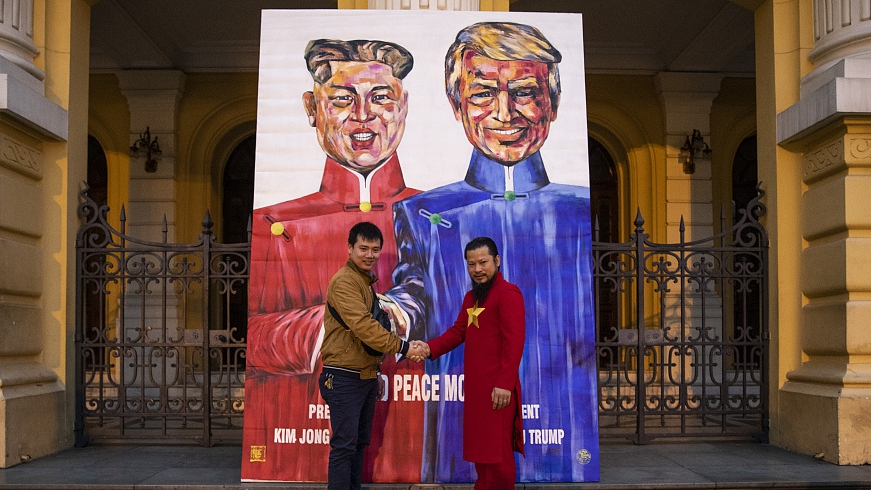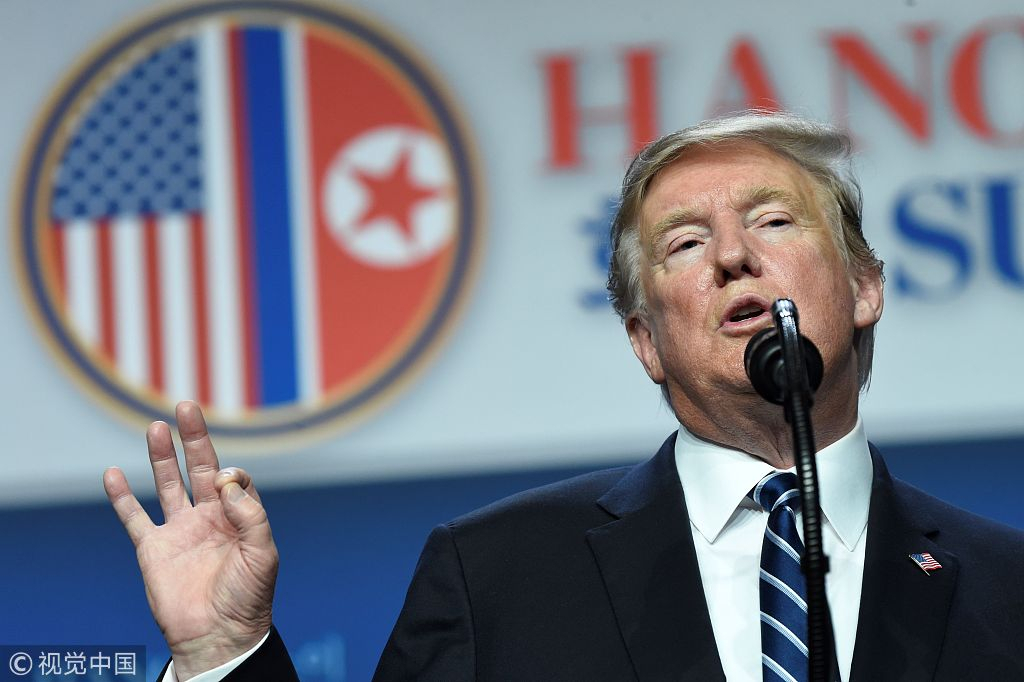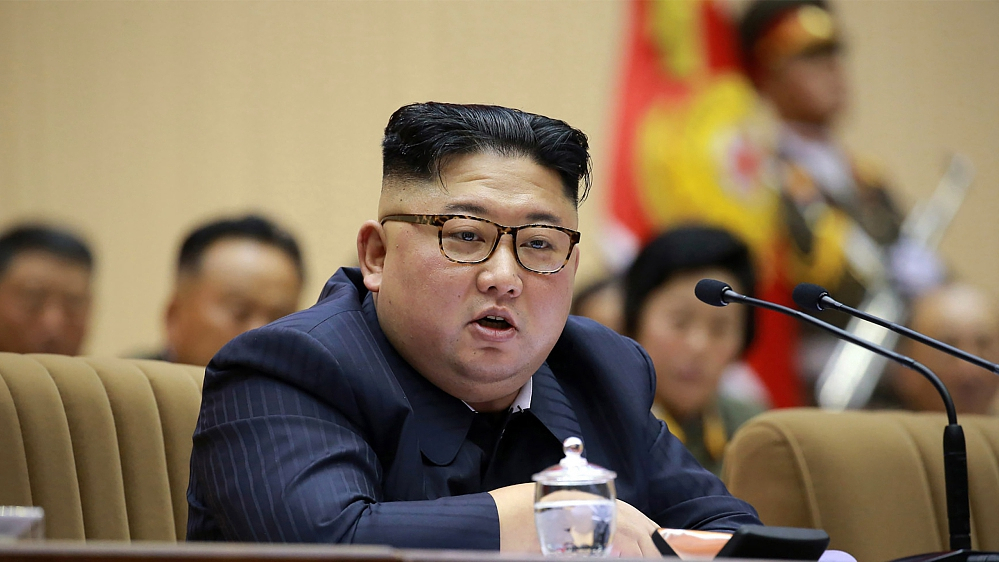
Opinion
14:54, 14-Apr-2019
The pitfalls of a 3rd Trump-Kim summit
Updated
15:38, 14-Apr-2019
Tom Fowdy

Editor's note: Tom Fowdy is a British political and international relations analyst and a graduate of Durham and Oxford universities. He writes on topics pertaining to China, the DPRK, Britain and the U.S. The article reflects the author's opinion, and not necessarily the views of CGTN.
On April 13, both Democratic People's Republic of Korea (DPRK) leader Kim Jong Un and U.S. President Donald Trump openly proclaimed their interests in holding a third summit with each other. However, in doing so both sides conditioned to strictly adhere to their own criterion as to what it would achieve. Through the DPRK's primary news source KCNA, Kim first expressed that he wanted such a meeting only on the conditions that it constitutes a "fair" deal, urging the White House to make a "wise decision." In doing so, he also hinted at speculation that if Washington is not prepared to negotiate fairly, the country may be prepared to return to confrontation in the future.
On those grounds, he appeared to set a year deadline for the U.S. to make its move. Taking to Twitter, Trump responded with positive enthusiasm to the proposal and praised his relationship with the DPRK leader. Nevertheless, he highlighted a time "when Nuclear Weapons and Sanctions can be removed" indicating no change as of present to his position.
Whilst a third summit will be a welcome development for those advocating diplomacy and peace on the Korean Peninsula, this is an event which should not be rushed into or held without extensive preparation, direction and diplomatic foundations over the course of several months. Trump's personal style of emphasizing "grand deals" in the attempt to get as much as possible in the apex of the moment is counterproductive. His belief that he can also buy complete DPRK denuclearization is also misleading and has not yielded results.
Given this, save there are substantial changes, there are more risks at present in holding a new summit than not, especially if Pyongyang's very clear position continues to be taken for granted.

U.S. President Donald Trump speaks during a press conference following the second U.S.-DPRK summit in Hanoi, February 28, 2019. /VCG Photo
U.S. President Donald Trump speaks during a press conference following the second U.S.-DPRK summit in Hanoi, February 28, 2019. /VCG Photo
The idea of meetings between the president of the U.S. and the leader of the DPRK is something largely created by Trump. From 2016 he spoke of meeting with Kim "over a hamburger" to solve the nuclear issue. None of his predecessors would do so, such a summit being part of the unconventional, unique and attention-grabbing character of the U.S. president, who owing to his business career places faith in the idea of personal exchanges to pull off grand deals.
Thus from the beginning, he has envisioned that by doing so he can make direct appeals to Kim Jong Un and achieve things which others could not. A part of this, as illustrated by his rhetoric, seems to indicate he believes he can "buy" the country's complete denuclearization through the promise of complete and lucrative sanctions relief. Hence he continues to talk about the "tremendous potential" of the DPRK economy each time, most recently being last night.
This strategy is counterproductive, it is mistaken to its very core. Whilst Kim Jong Un is willing to endorse such summits for the fact they strengthen his personal legitimacy and international standing, Trump's strategy cannot account for the fact that owing to Kim's political interests, he cannot buy out by an appeal to greed. That isn't what he's looking for here. We don't need to discuss again why the country won't fully denuclearize, it's been said enough, but it is worth mentioning the ideological paradigm of the DPRK political order cannot logically trade away nuclear weapons for a new politics based purely on economics.
In such a scenario the state is not only placed in a position of strategic weakness, but the status quo simply cannot sustain itself. Thus, Trump's highly transactional, finalistic and all engulfing approach to denuclearization can never change Pyongyang's considerations. Not are the goals wrong, but the methods are wrong too. Diplomacy in these circumstances cannot be a simple "win-lose" business matter.

DPRK leader Kim Jong Un speaks at the 5th meeting of company leaders and political instructors of the Korean People's Army in Pyongyang, March 27, 2019. /VCG Photo
DPRK leader Kim Jong Un speaks at the 5th meeting of company leaders and political instructors of the Korean People's Army in Pyongyang, March 27, 2019. /VCG Photo
Whilst hardliner advisers are also to blame for the absolutism of the U.S. position and the idea Pyongyang can be forced to "caving in," these "all or nothing" grand bargains are very much Trump's own doing. If he tries to play the same hand again, it won't work, the DPRK leader's statement has made that clear.
Given this, a third summit cannot be a means to an end for agreements between the two countries, and in turn should not be held until Trump reconsiders his strategy. This should involve considerably low level "on the ground" diplomacy with the view to laying out common ground on smaller courses of action that both sides can agree on, with the goal of preempting something more meaningful in the long run.
For this itself to work, the administration needs to drop "all or nothing" approaches, be willing to accept the "step by step" basis to diplomacy and take credit for achieving small goals at a time, than running the risk of reversing everything in the pursuit of a finale up front for Trump's personal glory. In turn, it also needs to recognize that offering smaller concessions to the DPRK do not constitute a form of appeasement and if you are not willing to shift on that, then no progress will be made.
As a whole, if the administration cannot learn and shift from the mistakes which it is making in regards to the DPRK, then opportunities will be lost and risks will abound. Kim Jong Un is making his position clear. If he is to deal with Washington, then it must take into consideration his terms. If not, then he is reminding us yet again that there is a risk on the horizon he may choose to turn away from the table, simply because the U.S. is not being prepared to negotiate in good faith.
Trump's thinking that both an unrelenting insistence upon pressure, and that "grand bargains" in summits with the goal of getting everything can achieve America's goals on the DPRK issue, are ultimately not working.
(Cover photo: People pose for a photograph with a picture of DPRK leader Kim Jung Un and U.S. President Donald Trump outside the Hanoi Opera House in Hanoi, Vietnam, February 28, 2019. /VCG Photo)
(If you want to contribute and have specific expertise, please contact us at opinions@cgtn.com.)

SITEMAP
Copyright © 2018 CGTN. Beijing ICP prepared NO.16065310-3
Copyright © 2018 CGTN. Beijing ICP prepared NO.16065310-3